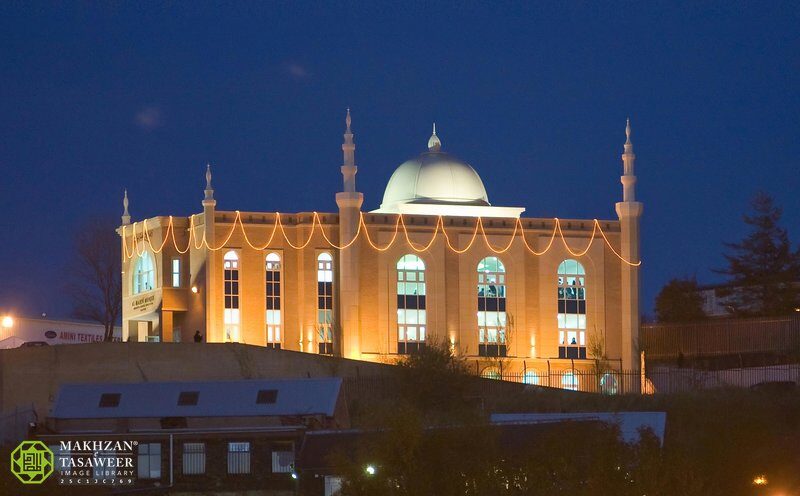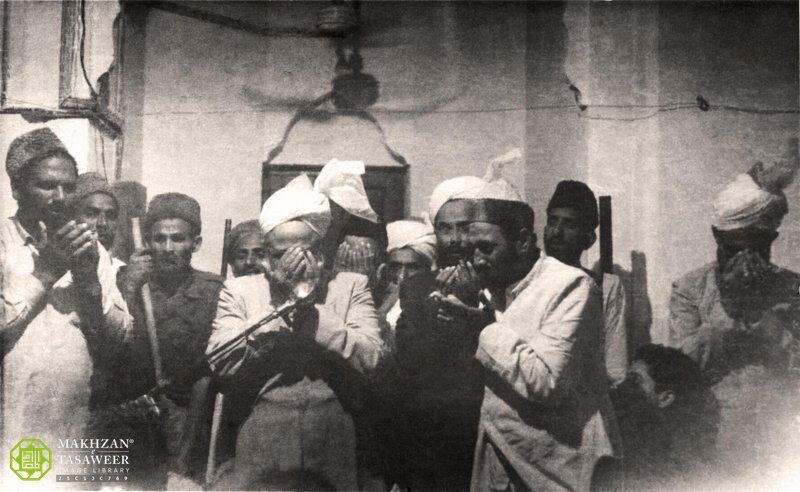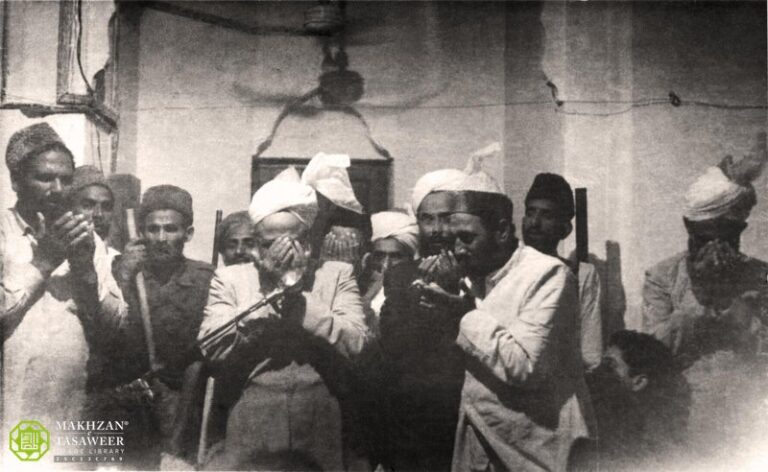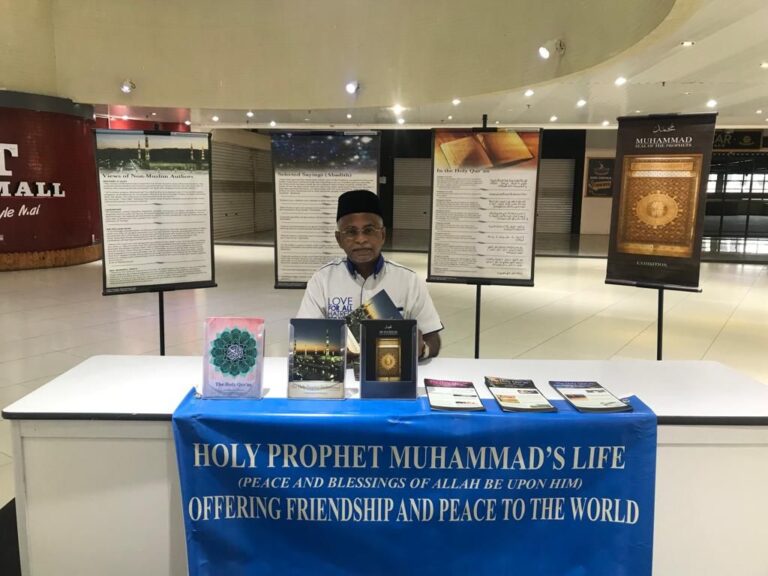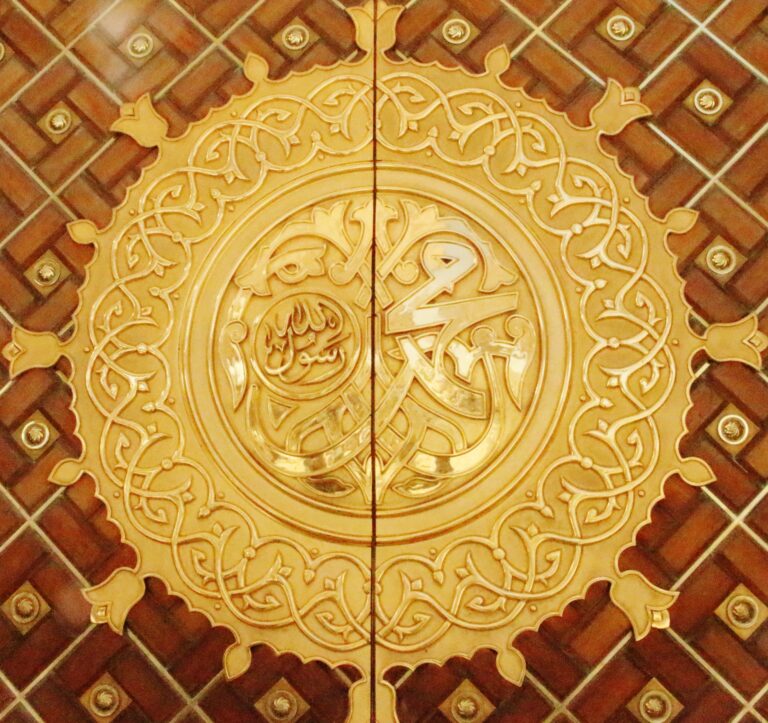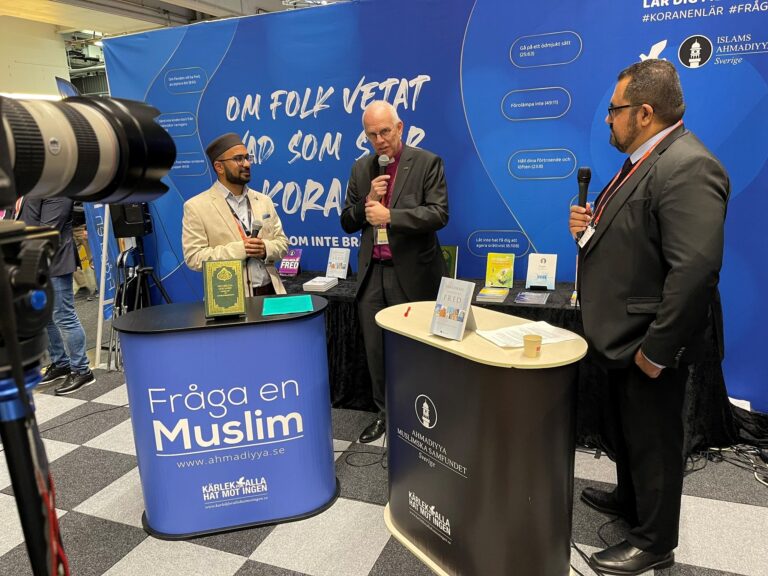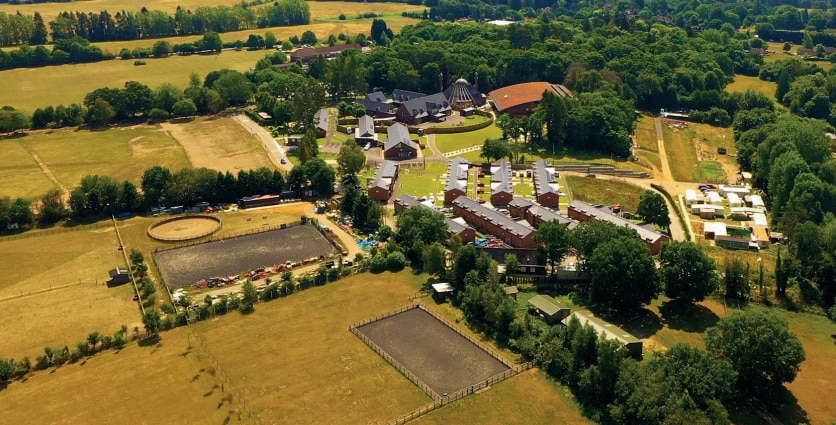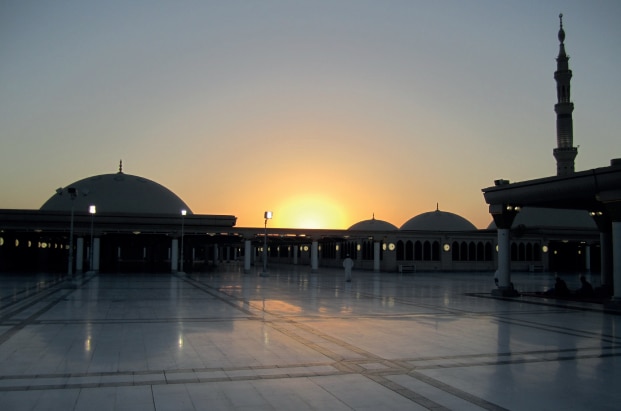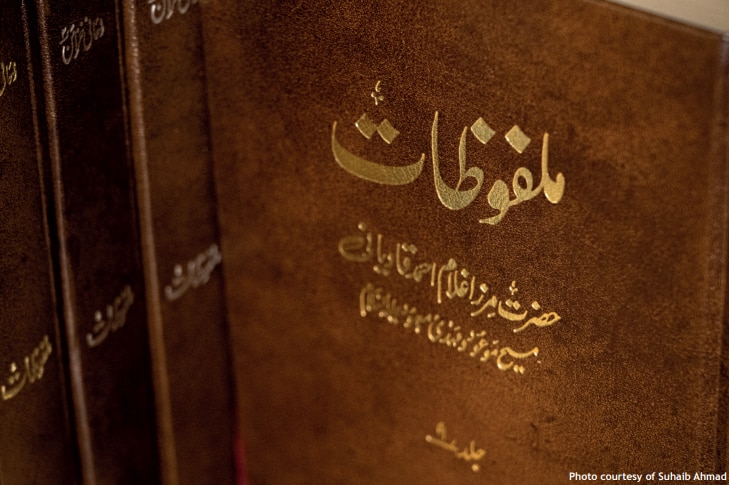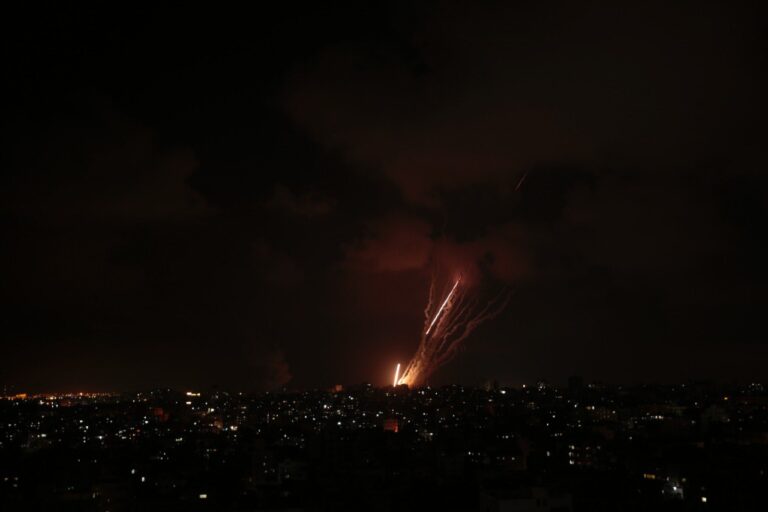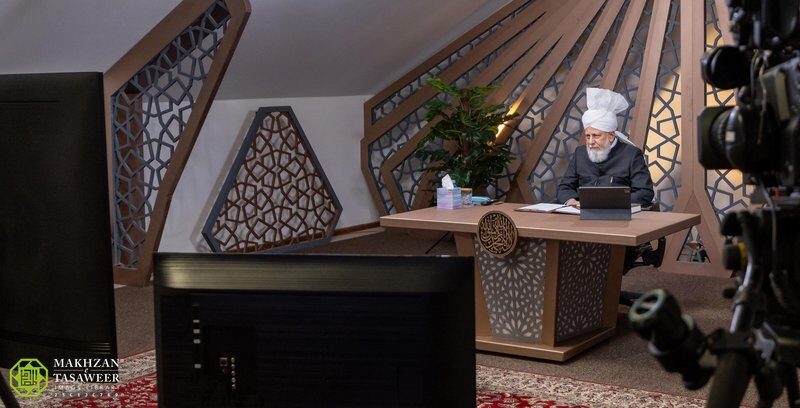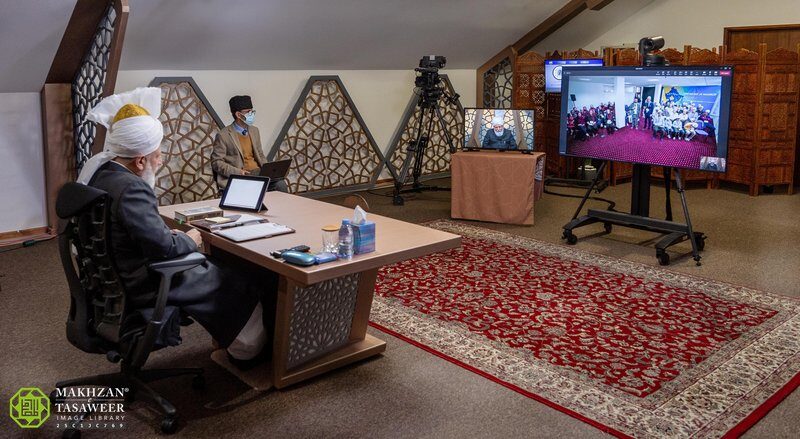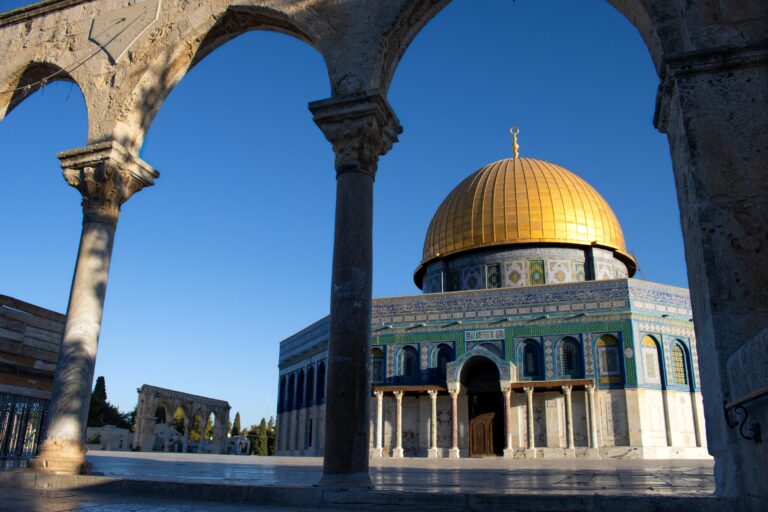Friday Sermon
6 October 2023
Muhammadsa: The Great Exemplar
After reciting the tashahud, ta‘awuz and Surah al-Fatihah, Hazrat Khalifatul Masih Vaa stated:
The incident regarding the killing of ‘Asma was mentioned in the previous sermon, and I also mentioned that there is another similar incident. The other incident also seems to be a mere fabrication. The second incident is about the killing of a Jewish man, Abu ‘Afak. It is mentioned that the killing of Abu ‘Afak, is another fictitious incident that has been recorded in the books of history. The details are as follows.
One day, the Holy Prophetsa said to the companions, “Who can settle the matter of this wretched man (i.e. Abu ‘Afak) on my behalf?” That is, who can kill him? Abu ‘Afak was an extremely old man, and it is said that he was 120 years old. However, this individual would instigate people against the Holy Prophetsa and would use foul and abusive language in his poetry against the Holy Prophetsa. Upon this instruction of the Holy Prophetsa, Hazrat Salim bin ‘Umairra stood up. He was among those people who would weep profusely due to the fear of Allah the Almighty. He also participated in the Battle of Badr. Hazrat Salimra said, “I vow to either kill Abu ‘Afak, or I will die trying.” Hence, following this, Hazrat Salim bin ‘Umairra remained in search of the right opportunity. One day, at night, in the intense heat, Abu ‘Afak was sleeping in the garden, in the courtyard of his house, Hazrat Salimra came to know of this, and he immediately set off. When Hazrat Salimra reached his house, he placed his sword over the liver of Abu ‘Afak and pushed it down with all of his weight, so much so that it pierced his stomach and got stuck in his bed. At the same time, the enemy of God, Abu ‘Afak let out a harrowing scream. Hazrat Salimra left him in this very state and departed. Hearing Abu ‘Afak’s scream, people immediately came running, and some of his friends immediately took him inside. However, this enemy of God was unable to recover from this deep wound and died. (Al-Sirah al-Halabiyyah, Vol. 3, p. 300, Dar al-Ma’rifah Beirut, 2012)
This incident has been recorded as such in one of the books of history. This is another incident that has not been related through a reliable chain. It is not mentioned in the Six Authentic Books of Hadith either. It can, however, be found in some books of history, such as Sirat al-Halabiya, Sharh al-Zurqani, Tabaqat al-Kubra by Ibn Sa’d, Sirat al-Nabawiyyah by Ibn Hisham, Al-Bidayah wa al-Nihayah, Kitab al-Maghazi by Waqidi and Subul al-Huda wa al-Rishad etc. However, it is not recorded in most books of history, such as al-Kamil fi al-Tarikh, Tarikh al-Tabari, Tarikh Ibn Khaldun etc. However, as stated earlier, it is mentioned in some books of history.
Similar to the incident of ‘Asma, people have testified in relation to this incident [about Abu ‘Afak] that he would incite people to oppose and be hostile towards the Holy Prophetsa. Following the Battle of Badr, his malice and rancour intensified, and he openly began to rebel. The contradictions within the narrations relating to the killing of Abu ‘Afak also make this incident doubtful. First of all, there is a discrepancy regarding the person who killed him. According to Ibn Sa’d and Waqidi, Salim bin ‘Umair killed Abu ‘Afak, whereas in some other narrations, Salim bin ‘Umar is mentioned, and according to Ibn ‘Uqba, Salim bin ‘Abdullah bin Thabit Ansari killed him.
Secondly, there are discrepancies in the reasons stated for the killing. According to Ibn Hisham and Waqidi, Salim killed him out of his own passion, whereas according to some narrations, it was upon the instructions of the Holy Prophetsa that he killed him. (Sharh al-Zurqani, Vol. 2, p. 347, Dar al-Kutub al-Ilmiyya, Beirut, 1996; Ibn Hisham, Al-SIrah al-Nabawiyyah, p. 887, Dar al-Kutub al-Ilmiyyah, Beirut, 2001; Kitab al-Maghazi li al-Waqidi, Vol. 1, p. 163, Dar al-Kutub al-Ilmiyya, 2013; Subul al-Huda wa al-Rashad fi Sirah Khair al-‘Ibad, Vol. 6, p. 23, Dar al-Kutub al-Ilmiyyah, Beirut, 1993)
This has also been written by Ibn Hisham.
The third aspect is regarding difference [of opinion] about the religion [of Abu ‘Afak]. According to Ibn Sa’d, Abu ‘Afak was a Jew, whereas Waqidi was of the opinion that he was not a Jew. (Ibn Sa’d, Al-Tabaqat al-Kubra, Vol. 2, p. 21, Dar al-Kutub al-Ilmiyyah, Beirut, 1990; Kitab al-Maghazi li al-Waqidi, Vol. 1, p. 163, Dar al-Kutub al-Ilmiyyah, 2013)
There are also discrepancies in the time of the killing. According to Waqidi and Ibn Sa’d this incident took place after the killing of ‘Asma bint Marwan, while according to Ibn Ishaq and Ibn Hisham, etc., this incident took place prior to the killing of ‘Asma. (Ibn Sa’d, Al-Tabaqat al-Kubra, Vol. 2, pp. 20-21, Dar al-Kutub al-Ilmiyyah, Beirut, 1990; Kitab al-Maghazi li al-Waqidi, Vol. 1, p. 161, 163, Dar al-Kutub al-Ilmiyyah, 2013; Ibn Hisham, Al-Sirah al-Nabowiyyah, pp. 886-887, Dar al-Kutub al-Ilmiyyah, Beirut, 2001)
It is evident from these clear contradictions that this incident is fabricated, fictitious, and not based on reality. If, for argument’s sake, it is considered that Abu ‘Afak was indeed killed, then his other crimes, such as inciting to kill the leader of the state, reciting satirical couplets whilst provoking war, endangering public peace, and igniting the flame of war, were all sufficient for the death penalty. Even today, the death penalty is enacted if it is proven that a person has committed treason against the government. It cannot be that mere cursing was the reason for his being sentenced to death. Likewise, just as was the case with the incident of ‘Asma, there is no evidence of the Jews taking any action upon the [supposed] killing of Abu ‘Afak. Certainly, there would have been some sort of reaction from the Jews upon his killing, yet there is no record of such a reaction. Hence, their silence upon this incident is conclusive proof that it has been fabricated.
It is also noteworthy that it is said that these incidents took place prior to the Battle of Badr or immediately after. They either happened sometime before, or just after. All of the historians agree that the very first altercation between Muslims and Jews was the Ghazwah of Banu Qainuqa’. And so, if some other incident had taken place before the Battle of Badr, then historians would have mentioned it in this context. As a result, based on the killings of Abu ‘Afak and ‘Asma, the Jews could have been justified in saying that the Muslims were the ones to initiate conflict. However, there is no mention anywhere of the Jews of Medina bringing forward these incidents or raising such an allegation.
Hazrat Mirza Bashir Ahmadra has written in The Life and Character of the Seal of Prophetssa regarding the fabricated incidents about the killings of ‘Asma and Abu ‘Afak:
“After the events of the Battle of Badr, Waqidi and other historians have written two incidents, which are nowhere to be found among the books of ahadith and authentic historical records. Even if a person contemplates in terms of Dirayat, they do not prove to be correct. However, since they furnish an apparent means for levelling an allegation against the Holy Prophetsa, various Christian historians, as per their habit, have alluded to these instances in a very unpleasant manner. The first of these fabricated incidents relates to a lady named ‘Asma’ who used to reside in Medina (there is mention of ‘Asma here once again) and was a staunch enemy of Islam. She would speak ill of the Holy Prophetsa and would greatly incite people against the Holy Prophetsa through her provocative couplets and inflame people to murder the Holy Prophetsa. Finally, in his rage, a blind companion named ‘Umair bin ‘Adiyy killed her whilst she was in her home at night, during her sleep. When the Holy Prophetsa was informed of this occurrence, the Holy Prophetsa did not reprimand him; rather, in a way, he even commended the action. (However, to say that the Holy Prophetsa commended his action does not mean that he actually did commend it. In fact, I have already proven this incident to be false.)
“The second incident, that has been mentioned, is that of an elderly Jewish man named Abu ‘Afak, who lived in Medina. This person would also recite provocative couplets against the Holy Prophetsa and would incite the disbelievers to wage war against the Holy Prophetsa and assassinate him. Eventually, he too was killed by a Companion named Salim bin ‘Umair in his fury, during the night, whilst he was in the veranda of his own home.” This is what has been narrated. Hazrat Mirza Bashir Ahmadra further writes:
“Waqidi and Ibn Hisham have even written some of the provocative couplets which ‘Asma’ and Abu ‘Afak had composed against the Holy Prophetsa. Sir William Muir and others have embellished their books with these two incidents in a very unpleasant manner. (The orientalists have taken these incidents and used them as an excuse to show how much injustice was perpetrated.) However, the truth is that, in the face of scrutiny and criticism, these incidents cannot even be proven to have occurred at all. The first argument, that puts the authenticity of these two incidents into question is that they are nowhere to be found among the books of ahadith. In other words, there is not a single Hadith in which an occurrence of this nature has been related, along with the names of the assassin or victim. As a matter of fact, putting the ahadith to one side, even various historians have not alluded to these incidents; whereas if incidents of this nature had actually taken place, there was no reason for the books of ahadith and various books of history to be empty of their mention. At this instance, it cannot be speculated that since an allegation fell upon the Holy Prophetsa and his Companions, may Allah be pleased with them, the muhaddithin and various historians probably omitted these occurrences. The reason is that, firstly, the circumstances in which these occurrences took place are not objectionable. (If one takes into consideration how much he was provoking and inciting against the government, even then, it would not have been objectionable had this actually taken place. Therefore, it is incorrect to allege that the historians and muhaddithin did not mention this on the basis of it being a criticism of the Holy Prophetsa.)
“Secondly, any individual who possesses even an elementary study of the ahadith and history cannot be oblivious to the fact that the Muslim muhaddithin and historians have never omitted a narration merely on the basis that it may apparently seem to raise an objection against Islam or the Founder of Islam. Their sure practice was that they would never be reluctant at all in relating whatever they found to be authentic in terms of riwayat, merely due to its subject matter.
“As a matter of fact, the practice of some muhaddithin and most historians was that they would honestly include within their collections any narration at all that reached them regarding the Holy Prophetsa and his Companions (may Allah be pleased with them), even if it was weak and unreliable, both in terms of riwayat and dirayat. They would then leave it to the judgement of theologians and research scholars of later times to distinguish between authentic and weak narrations for themselves. Moreover, in doing so, their intention was that anything at all that was attributed to the Holy Prophetsa and his Companions, whether it seemed to be true or false, should not be omitted from inclusion. It is for this reason that all kinds of reliable and unreliable narrations have been gathered in the early works of history. However, this does not mean that all of it is acceptable; rather, now it is our work to differentiate between the weak and authentic. In any case, there is not even an iota of doubt that any Muslim muhaddith or historian ever disregarded a narration merely on the basis that apparently it seemed at odds with the greatness of the Holy Prophetsa or his Companions, or because an allegation fell upon the Holy Prophetsa or Islam as a result.
“As such, the executions of Ka‘b bin Ashraf and Abu Rafi‘, the Jew, which completely resemble the so-called incidents of ‘Asma’ and Abu ‘Afak, have been mentioned in all the books of ahadith and history with full clarity and detail, and no Muslim narrator, muhaddith or historian has neglected to mention them. In these circumstances, since the execution of ‘Asma’ and Abu ‘Afak, the Jew, have not been mentioned in any Hadith, and then, the various historians from among the early historians are also silent with regards to this issue, it is almost clearly established that these are fabricated tales that have somehow found their way into various narrations, and thus become a part of history.
“Then, if one studies the details of these tales, their fabricated nature becomes even more evident. For example, in the tale of ‘Asma’ the name of the assassin as related by Ibn Sa‘d and others, is ‘Umair bin ‘Adiyy. However, in contrast, the name of the assassin, as related by Ibn Duraid is not ‘Umair bin ‘Adiyy, rather, the name is Ghishmir. Suhaili declares both of these names as being incorrect and asserts that in actuality, ‘Asma’ was killed by her own husband, whose name has been related as Yazid bin Zaid in various narrations. Then, in other narrations, it is related that none of the above-mentioned people killed ‘Asma’, rather, the assassin was an anonymous person who belonged to her own people. Ibn Sa‘d and others have named the victim as being ‘Asma’ bint Marwan, but there is a statement of ‘Allamah Ibn Abdul-Barr that she was not ‘Asma’ bint Marwan, but in fact, ‘Umair killed his own sister whose name was Binti ‘Adiyy.
“Ibn Sa‘d has written that the killing took place in the middle part of the night. However, the narration of Zarqani establishes that the account took place during the day, or at most, in the early part of the night, because the narration mentions that at the time, the victim was selling dates. (I have mentioned all these details already.)
“The second incident (which is currently under discussion) is the execution of Abu ‘Afak. For this occurrence, Ibn Sa‘d, Waqidi and others have written that the assassin’s name was Salim bin ‘Umair. However, in some narrations, his name has been recorded as Salim bin ‘Amr, while Ibn ‘Uqbah has mentioned the name Salim bin ‘Abdullah. Similarly, with respect to the victim, Abu ‘Afak, Ibn Sa‘d has written that he was a Jew, while Waqidi has not described him as such. Then it is ascertained from both Ibn Sa‘d and Waqidi that Salim killed Abu ‘Afak out of anger by his own accord. However, in one narration, it has been related that he was executed upon the instruction of the Holy Prophetsa. Even with respect to the time of the execution, Ibn Sa‘d and Waqidi place it after the execution of ‘Asma’. However, Ibn Ishaq and Abur-Rabi‘ state that it occurred prior to the execution of ‘Asma’. All of these contradictions result in the strong doubt that these tales are fabricated and false, or if there is some truth in them, it is so obscure that a statement cannot be passed with respect to its details and nature.
“Another argument that establishes these incidents as being false, is that the era in which both these tales are said to have taken place, is one with respect to which all historians are unanimous that, until that time, no confrontation or dispute had yet arisen between the Muslims and Jews. History establishes that the Ghazwah of Banu Qainuqa’, was the very first battle, that took place between the Muslims and Jews, and that the Jews of Banu Qainuqa’ were the first ones to practically step forward in their enmity towards Islam. How then can it be accepted that prior to this ghazwah, such killing and bloodshed had taken place between the Jews and Muslims? Furthermore, if such events had in fact transpired prior to the Ghazwah of Banu Qainuqa’, then it was impossible for them to not have been listed among the factors, etc., leading up to this ghazwah. (These incidents have not been cited as reasons leading to the battle. However the killing of these two people should have been mentioned.) At the least, the Jewish people, who could have capitalised on an apparent opportunity to raise an allegation against the Muslims on the basis of these events, that it was the Muslims who initially provoked physical conflict, would have raised an outcry over these incidents. Yet, in no historical record, and even in the works of those historians who have transmitted these tales, there is absolutely no mention whatsoever that the Jews of Medina ever raised such an allegation. If someone believes that perhaps they did raise an objection, but Muslim historians conveniently omitted it, then this would be an erroneous and baseless notion. For as already mentioned, no Muslim muhaddith or historian has ever placed a veil upon any allegation levelled by an opponent. For example, in the incident of the Sariyyah of Nakhlah, when the idolaters of Mecca raised an objection against the Muslims for dishonouring the sacred months, Muslim historians recorded this allegation in their books with unprecedented integrity. Hence, if any such allegation had been raised by the Jews on this occasion, historical records would not have been empty of its mention. Therefore, these tales do not prove to be correct from any perspective of analysis. It seems as if a hidden enemy of Islam either related these tales, whilst attributing them to some Muslim, and then they found way of inclusion in the narrations of the Muslims; or perhaps a weak Muslim included these narrations into the historical record in order to attribute the false pride towards his own tribe that such men as were related to him killed various harmful disbelievers. Allah knows best.
“This is the actual reality which is ascertained with respect to these incidents. However, as it has been indicated previously, even if these occurrences were true, they cannot be considered objectionable under the circumstances in which they took place. In those days, the vulnerable state with which the Muslims were confronted, has already been described above. Their state was exactly like that of a person who becomes surrounded in such a place that is engulfed by a dangerously blazing fire on all four sides to as far as one can see, and he has no place of escape; and such people are standing beside him who are thirsty for his blood. In this extremely vulnerable state of the Muslims, if an evil and mischievous person incites people against their Master and Chief by reciting provocative couplets and provokes his enemies to assassinate him, what other solution could there have been in the circumstances of that era, except for putting an end to such a person?
“Then, this action was performed by the Muslims only in a state of extreme provocation – a state in which a minor killing cannot be considered enough for retribution. As such, even an individual like Mr. Margoliouth (he is also an orientalist), who generally takes an opposing stance on every matter, does not hold the Muslims worthy of condemnation on account of these incidents.
“Hence, Mr. Margoliouth writes:
“‘Since, if the verses ascribed to ‘Asma be genuine, she had deliberately incited the people of Medinah [sic] to a murderous attack on the Prophet, her execution would not have been an inexcusably ruthless measure, judged by any standard; and it must not be forgotten that satire was a far more effective weapon in Arabia than elsewhere…and from the fact that only the culprit suffered, it was a decided improvement on the existing system (only the perpetrator was killed, and not others as well), by which satire on an individual meant war between whole tribes. In place of this the principle that each person shall suffer for his own fault and not their friends or relatives was introduced by Islam instead.’
“If Mr. Margoliouth has any objection with respect to these executions, it is only with regards to the manner in which they were carried out. In other words, why were they not officially executed after the formal announcement of their crimes? The first answer to this is that even if these incidents are deemed as being true, they were the individual actions of certain Muslims themselves, which were committed by them after they had been immensely provoked. The Holy Prophetsa did not order these actions, and this is categorically established by the record of Ibn Sa‘d.
“Secondly, if hypothetically, it is accepted that the Holy Prophetsa had ordered these actions, even still, the circumstances of that era were most definitely such, that if an official judgement had been formally passed with regards to the execution of ‘Asma’ and Abu ‘Afak, and the relatives of the criminals were to have been informed in advance that their people were to be executed, this could have entailed dangerous consequences. Furthermore, there was also strong apprehension of the fact that these incidents could have set ablaze a vast fire of war between the Muslims and Jews, and even between the Muslims and idolaters of Medina.”
Hazrat Mirza Bashir Ahmadra writes, “It is strange that while Mr. Margoliouth has considered the mere action of killing to be permissible in light of the specific circumstances of Arabia at the time, why then with respect to the method of execution was his observation unable to take into account the specific circumstances of that era? In this regard as well if he had taken into account the specific circumstances of that era, perhaps he would have been convinced that the method employed (if in fact these killings did take place) was most appropriate and necessary for the circumstances of that era and in the interest of the public peace (but none of this actually happened.) […] In summary, firstly, the incidents of the execution of ‘Asma’ and Abu ‘Afak, the Jew, do not even hold to be true in terms of riwayat and dirayat. Then, if they are hypothetically accepted as being true, they cannot be considered objectionable in light of the circumstances of that era. Then, whatever the case, may be these killings were the individual actions of certain Muslims, which were committed by them after they had been seriously provoked, and the Holy Prophetsa did not issue any such order.” (The Life and Character of the Seal of Prophetssa, Vol. 2, pp. 266-273)
To allege that the Holy Prophetsa gave the orders to kill them is completely baseless.
These are all fabricated statements that have been attributed to the Holy Prophetsa. The historians have documented all these accounts; however, later on, the accounts ought to have been properly assessed. We are thankful to Allah the Almighty, and it is His favour upon us that He has enabled us to accept the Imam of the Age. As a result, we carefully assess and reflect over every matter and present it after understanding the true facts of the matter. And we strive to provide a rebuttal against any allegation that is levelled against the Holy Prophetsa. May Allah the Almighty grant wisdom to these academics, who spread [such false notions] in order to fulfil their vested interests and defame Islam. They claim to be serving Islam, yet in reality, their actions have led to extremism. May Allah the Almighty grant them wisdom.
I shall now mention the details of some deceased members. The first mention is of Professor Dr Nasir Ahmad Khan, who was more commonly known by the name of Pervaiz Parvazi. He recently passed away in Canada at the age of 87:
اِنَّا لِلّٰہِ وَاِنَّاۤ اِلَيۡہِ رٰجِعُوۡنَ
[Surely, to Allah we belong and to Him shall we return.]
He was born in Qadian. His father’s name was Maulana Ahmad Khan Naseem, who was a missionary. He served as Additional Nazir Islah-o-Irsahd Muqami for a long period of time. He had a very bold personality and had helped organise the various jamaats. The deceased’s mother was Rehmat Bibi. Parvazi Sahib attained his early education in Qadian. After his matriculation exams, he did not go to college because, at the time, the Talim-ul-Islam College was in Lahore. Later, when the college relocated to Rabwah, he enrolled in the college. In 1958, he attained a BA (Hons) degree, and in 1960, he obtained his MA from the University Oriental College. He then obtained his PhD from Punjab University in 1968. Professor Nasir Parvazi also obtained an MA in Urdu and was appointed as a lecturer thereafter. He began his teaching career at a government college in Muzaffargarh. He also began to make literary contributions and his articles were published in Al Fazl, the Monthly Misbah, Khalid, etc. He also had a keen interest in poetry and produced very good poetic works. When the Talim-ul-Islam College was established in Rabwah, he dedicated his life to the service of Islam and joined the college and he continued to serve as a lecturer until 1969. He was appointed Head of the Urdu Department at Talim-ul-Islam College, Rabwah from 1969 to 1975. From 1975 to 1979, he worked as a visiting professor in Japan at Osaka University in its School of Foreign Studies. During his tenure, he made a great effort to strengthen the relationship between Pakistan and Japan. He also helped with the establishment of the Jamaat in Tokyo. He returned to Pakistan in 1979, and after the nationalisation of the colleges, he worked at different colleges in Pakistan as an assistant professor. From 1986 to 1990, he taught as an assistant professor at Government College Faisalabad. Due to being an Ahmadi, he had to endure a lot of hardships during this period. Eventually, when the situation worsened to the point that he was even arrested, he left everything and came to the UK. He met Hazrat Khalifatul Masih IVrh and upon his instructions, he migrated to Sweden where he worked as a professor in Uppsala University in Sweden from 1991 to 2001. During his tenure in Sweden, he also had the opportunity to be a member of the Noble Prize Committee for Literature and continued to serve in this role for 16 years. In 2003, he migrated to Canada. He is well-known in the fields of literature and academia. His wife is Amatul Majeed Sahiba, the daughter of Maulvi Muhammad Ahmad Jaleel. Allah the Almighty blessed them with two sons and three daughters.
His wife says, “We were together for 63 years, and he continuously gave me full support in every moment, in prosperity and hardship; happiness and sadness. Since, I was the eldest daughter of my parents and remained in Rabwah, Professor Parvazi never stopped me from serving them. In fact, he served them even more than me. He was an excellent example of upholding familial relations with my family members, i.e., relations from the wife’s family, in an exemplary manner. He would treat all his relations with great love and sincerity. He would take part in all their occasions of happiness and sadness.
His son, Tahir Ahmad Khan, says: “Whatever the circumstances may be, he always had a smile on his face. He had immense love for the Ahmadiyya Caliphate. Until his last breath, he had this connection (with me) and would request prayers.” Recently, his health took a turn for the worse and the doctors had given up hope. It was very difficult for him to write, initially he sent messages [for prayers], and then at times he would send a handwritten letter, which was barely legible, that he would write whilst laying down in his bed. He had a bond of great loyalty and sincerity. With regards to his stay in Japan, his son writes: “My father won a prize of an encyclopaedia, which was a prestigious award at the time. He later donated it to the Khilafat Library. In the 80’s, he was awarded the Allama Iqbal Gold Medal for Literature, but because he was an Ahmadi, he was not called [for the ceremony] and instead, his medal was sent home.”
His daughter, Amatul Wadood, says: “My father loved the Holy Quran dearly. He would recite one part of the Quran every day without fail. If I ever needed a reference for an article or a speech, in an instant he would tell me to search for such and such verse and chapter. Our father instilled the love of the Caliphate within us. He gave us confidence that we could express what was in our hearts and establish a bond with the Khalifa.”
His other daughter, Sadia, says: “My father was an ardent devotee of the Khilafat. Through his actions and his conduct, one would always sense a deep bond of love and respect for the Caliphate. We have seen that before every action, our father would write a letter to the Caliph requesting prayers. In his final days of illness, when the doctors had expressed their concerns and were not very hopeful, as soon as he left the doctor’s room, he asked for a pen and paper. Despite the fact that his hands were weak and were shaking, he wrote a letter for prayers. (As I have mentioned earlier, he would write regularly.) He would sacrifice a lot in giving alms. Whatever amount he would have, he would give it away in charity.”
His maternal granddaughter, Naila, says: “Through my Nana [maternal grandfather] I learnt what the meaning of faith is and how one can truly love Allah the Almighty. One can see how a person can truly love Allah.” She further says: “I was surprised to see his condition and how, until his last breath, he would constantly recite ‘All praise belongs to Allah, All praise belongs to Allah’ by raising his index finger. He was reciting ‘All praise belongs to Allah’ until the very end.” She then says: “Upon seeing his love, a flame was lit within me, and I desired that the love he had for Allah the Almighty, the Holy Quran, and the Caliphate, should be instilled within me as well.”
May Allah the Almighty bestow His forgiveness and mercy upon the deceased, and may his children and progeny be able to carry on his virtuous deeds.
The second funeral is of Shareef Ahmad Bhatti, son of Ameer Khan Bhatti of Rabwah. He passed away recently at the age of 88.
اِنَّا لِلّٰہِ وَاِنَّاۤ اِلَيۡہِ رٰجِعُوۡنَ
[Surely, to Allah we belong and to Him shall we return.]
The deceased was a musi. He is survived by his wife, two sons and two daughters. One of his sons works in the Hifazat-e-Markaz and the other son, Tahir Ahmad Bhatti, is serving as a missionary in Sierra Leone.
His son, Tahir Bhatti, who is a missionary, writes: “My father used to tell us that when the prophecy of the death of Lekhram was fulfilled, at the time his own father, respected Ameer Khan Bhatti, was a young boy. He would say that when this prophecy was fulfilled, the truthfulness of Ahmadiyyat became etched in his heart, but owing to his young age, he was unable to go to Qadian and was unable to pledge allegiance. Later, he pledged allegiance at the hands of Hazrat Khalifatul Masih Ira and entered the fold of Ahmadiyyat. In 1974, owing to the disturbances and riots against Ahmadis, he had to leave Lalian and settled in Rabwah. He used to work in textile mills, but he never kept the fact that he was an Ahmadi hidden from anyone. Wherever he would work, he would tell them from the first day that he was an Ahmadi; if they wish to associate with him, then that is fine, as he would always identify as an Ahmadi.”
His brother Latif Ahmad, who resides in Germany, says, “He used to work in a textile mill. An opponent of Ahmadiyyat came into his department and said to him, ‘I have come to know that you are an Ahmadi.’ He replied by saying that indeed he was an Ahmadi, upon which the man started to speak ill against the Promised Messiahas. [The opponent] said, ‘Now, either you will stay in this mill or I will,’ and he made great efforts to persuade the owner of the mill and to create unrest. [The deceased] immediately began to pray, supplicating, ‘O Allah, help me for the sake of Your Promised Messiahas and cause this mischief to fail.’ After a while, someone came to him and informed him that the person who had been disrespectful to him earlier was sitting outside the mill in distress. The owner of the mill caught him stealing during one of his transactions and fired him from the mill. The deceased was regular in offering the Tahajjud prayers [pre-dawn voluntary prayer] and the five daily prayers, and always remained engaged in supplication. He read the literature of the Community extensively, and especially after his retirement, he started to read even more. A book from our Community’s literature was always by his bedside and he remained engaged in studying it. Whenever the Caliphs of Ahmadiyyat would draw attention to particular prayers, he would immediately take part. He recited the Durood Sharif [salutations upon the Holy Prophetsa] very frequently.” His son, who is a missionary, says, “When I was in sixth grade, he would tell me to recite the Durood Sharif on my way to, and from school. He also referred to himself, as saying that, by the grace of Allah the Almighty, he recited the Durood Sharif more than 1000 times in a day.” May Allah the Almighty grant him forgiveness and mercy, and may He enable his children to carry on his virtues.
The next mention is of Professor Abdul Qadir Dahri, the former Amir Jamaat of the Nawabshah District. He passed away at the age of 92.
اِنَّا لِلّٰہِ وَاِنَّاۤ اِلَيۡہِ رٰجِعُوۡنَ
[Surely, to Allah we belong and to Him shall we return.]
He is survived by his son and five daughters. Sammar Ahmad, his son, writes, “His family entered the fold of Ahmadiyyat through the deceased’s late father, Raees Muhammad Muqim Khan Dahri. Abdul Qadir Sahib was very a brave and honest person.” His son further writes, “He never hesitated to sit amidst the lower class of society, even though it was considered objectionable according to the customs of that area to have the poorer class sit amongst you equally. He acquired a Master’s degree in Sindhi literature from the university. In that era, there was a shortage of educational institutions in Sindh, and so, owing to his passion for education, he began working as a lecturer at a college in Hyderabad. Upon witnessing his passion for teaching, the principal there told him to open an educational institute in Nawabshah and hold evening classes there. Thus, those classes commenced and found great success. Thereafter, the institute became a college and was numbered amongst the renowned colleges of Sindh – all due to his efforts. Similarly, he also had very good relations with the Sindh’s major politicians and their families. He would openly tell them that he was from the Ahmadiyya Community, and he also advised his children never to conceal their faith in Ahmadiyyat. He always said, in the Sindhi language, that they were wearing the jewels of Ahmadiyyat, which was their distinguishing quality. He also had the honour of translating the Holy Quran into the Sindhi language upon the instruction of Hazrat Khalifatul Masih IIIrh. Also, upon the instruction of Hazrat Khalifatul Masih IIIrh, he had the opportunity to translate Tafsir-e-Saghir into the Sindhi language, which comprised two volumes. Due to the translation of the Holy Quran and the publication of a pamphlet on selected verses of the Holy Quran, under Section 295C, a lawsuit was filed against Hazrat Khalifatul Masih IVrh and four other individuals, including him. Apart from the Sindhi language, he had extensive expertise in the Urdu language, to the degree that whomever he wrote to was greatly impacted by his writing. He was also a member of the Fazl-e-Umar Foundation. PhD students from universities would come to seek consultation from him. He had a vast circle of acquaintances. He wrote a book in the Sindhi language that holds great importance in terms of guiding teaching experts and students alike. Furthermore, there were some words of mockery used in the dictionary whilst referring to the Dahri tribe in Sindh. In light of the commandments of the Holy Quran, he persuaded government officials with many arguments and had those discriminatory terms permanently removed from the dictionary. May Allah the Almighty grant him forgiveness and grant His mercy. May He also enable his children to carry on his virtues.
Another mention is of Professor Doctor Muhammad Sharif Khan, who had been residing in the USA. He passed away at the age of 84.
اِنَّا لِلّٰہِ وَاِنَّاۤ اِلَيۡہِ رٰجِعُوۡنَ
[Surely, to Allah we belong and to Him shall we return.]
By the grace of Allah the Almighty, he was a musi. He was born in 1939 in Tanzania. Ahmadiyyat was introduced to his family through his father, Doctor Habibullah Khan, who accepted Ahmadiyyat in Tanzania. Sharif Khan obtained his primary education from Qadian. As a result of the sermons delivered by Hazrat Musleh Maudra in 1954-1955, he dedicated his life [to serving Islam] when he was in the eighth grade. Then, in 1963, he obtained his MSc in Zoology with a gold medal. Then in 1996 he completed his PhD in Zoology from Punjab University. According to the instructions of Hazrat Khalifatul Masih IIIrh, he served at the Talim-ul-Islam College from 1963 until his retirement in 1998. He served for 35 years. The deceased had about 250 research papers published in publications around the world. His first research paper was published in 1972 and was on the subject of reptiles. He used to do a lot of research. He had done a great deal of research on snakes, lizards, insects and other animals. I was also his student. He would take our class outside, and he would show us various aspects of nature and the various insects found therein, along with their various types. In 2002, he was awarded “Zoologist of the Year” in Pakistan. Mujibullah Chaudhry of the USA writes, “In 2008, I spoke to him about collecting funds for the mosque, to which he said, ‘We don’t have anything to offer’, however he invited me to their home. When I went to their home, his wife placed a bundle of jewellery before me, including whatever she had received from her parents or her in-laws, saying that this should be accepted on their behalf.” He was very kind and humble. He always treated his students like his friends. May Allah the Almighty grant him His forgiveness and mercy.
His eldest son, Zafarullah Sahib, writes (these details were sent in later on), “Some scientists from the USA and Canada came to Rabwah to meet Professor Doctor Sharif Khan. According to those scientists, there was no greater expert in Pakistan than Sharif Khan Sahib when it came to reptology, or the study of reptiles.” He was a great expert. His son Rashid Zubair says, “He was regular in offering Tahajjud and keeping fasts from a young age. He would even lead prayers in the Qamar Mosque. Aside from offering prayers in congregation, he also regularly recited the Holy Quran and had a passion for studying its commentary. His studies in this regard were vast.” His grandson, Mashood Ahmad Khan, says, “Our grandfather was a very spiritual person and had deep scientific knowledge; he taught us that the proof for God’s existence can be found in one’s nature. He placed great emphasis on offering prayers on time and studying the Holy Quran. He had a great deal of love for the Ahmadiyya Khilafat. He would always write letters to the Khalifa of the time. Not only did he listen to the sermons himself, but he also drew the attention of those living at home towards this and would encourage them in this regard. May Allah the Almighty enable his children to carry on his good deeds.
(Official Urdu transcript published in the Daily Al Fazl International, 27 October 2023, pp. 2-7. Translated by The Review of Religions.)
